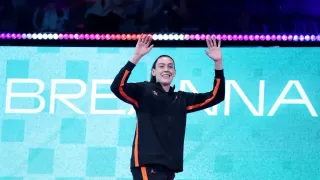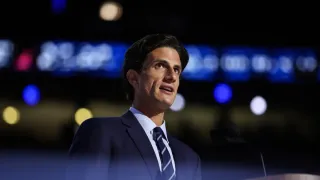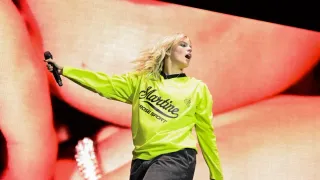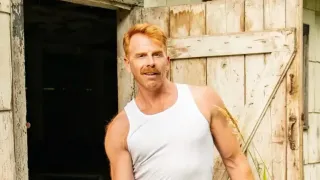
Jul 24
EDGE Interview: Still Just Wanna Have Fun - Cyndi Lauper on Her Final Tour and Next Chapter
Steve Duffy READ TIME: 3 MIN.
After more than four decades of bending pop to her will, Cyndi Lauper is hitting the road one last time — but don’t mistake this farewell for a quiet exit. As she launches the final leg of her Girls Just Wanna Have Fun tour, the Grammy, Emmy, and Tony winner reflects on a career built on radical self-expression, fierce activism, and music that refuses to be forgotten. At 71, Lauper is still raising her voice — for women, for the LGBTQ+ community, and for anyone who’s ever felt like an outsider — and she’s going out the way she came in: loud, passionate, and unapologetically herself.
EDGE: This is being billed as your farewell tour—how does it feel to be closing this chapter?
Cyndi Lauper: Pretty good. I am very excited to have the opportunity to do this. I'll be 72, and I'm still strong enough to sing and perform, which I'm excited about. It'll be great not to have to pack and unpack all the time, but the show itself is a wonderful thing to be part of. It's a real artist collective, and I feel really excited and honored to be part of it and to be collaborating with the artists that I'm collaborating with. I feel pretty lucky to be able to sing my music, do performance art, tell my story, and hopefully inspire other people to tell their story, because that is what promotes change. As I work in the humanities field, I believe it's essential to maintain a strong community connection.
EDGE: When you think back to releasing "Girls Just Want to Have Fun" in 1983, did you ever imagine it would still resonate over 40 years later?
CL: I hoped it would. I never had any intentions of making disposable music. I always wanted to make sure it was the best. I wanted to make sure that it sounded like the time, because I studied the impressionists in school. I was an art major, of course. I always felt that the impression and the sounds that were happening were very important. So, when you played it, you would remember what it was like the first time you heard it. Not only timeless, but it was important that it was the progression of humanity in the same way that all the songs that I listened to growing up helped me stand up and continue on my path. You stand on the shoulders of the people who came before you and contributed to music and the world, and when you contribute in a meaningful way, there will be people who will stand on your shoulders. I had every fucking notion that this music was not going anywhere, and that it was going to last because I wanted to contribute to humanity. I wanted it to sound timeless, but I also wanted you to remember what it sounded like, what it looked like, how it made you feel, and if it made you feel better. My whole idea was to make you feel better.
EDGE: Can you give us a glimpse into what fans can expect from the tour
CL: Come prepared to have a great time. I want you to feel great when you leave. That's what's important to me: that fans feel joy and hope. Remember that we can make light in the darkest of times, and as a community, we can change the world. Rock and roll has changed the world and can still change the world. Rock and roll can save the world.
EDGE: What’s one thing you’re going to miss most about touring?
CL: I'll miss my band the most. If I can come up with another show that doesn't involve a lot of movement, but still incorporates art and moves the work forward by bringing people together, then I will work with them. I am not stopping work; I am just starting a new chapter. There are many chapters in your life, and that's one thing that's part of this show. Sometimes we all forget there are many chapters in our lives. It's not just one thing. We are all writing the book of our lives.

EDGE: Do you approach performing ‘80s hits differently now than you did back then?
CL: I've done that, and now that I am saying goodbye, the fans don't want to hear a different song. They want to listen to the songs that help them remember the memories and good times. I may bust out into a little, but for the most part, I'm not doing that on this tour. I want everyone to listen and remember, to have that call-and-response. So, listen and be in the center of the rhythm and have fun.
EDGE: Is there a deeper message or theme behind the way you're presenting this tour, beyond just the hits?
CL: Well, it has art. It makes you laugh. It has a story. It has my story, which hopefully inspires other people to share their own. I want to inspire other people to come together because we're a community. We're a community of light, and we can make light in the darkest places. If we stand together, there is no limit to what we can accomplish. I always step forward to create art, sound, and story. I think it's important that, as a community, we come together and share our story because that's what changes things.
EDGE: You’ve been an outspoken advocate for LGBTQ+ rights, women’s rights, and more—how has your activism shaped your music and your legacy?
CL: All I can tell you is that I'm a friend of the queer community. Where I'm from, you don't stand by and watch your loved ones have their civil rights stripped and say nothing, because saying nothing is worse than doing it, well, almost. I know people evolve, and that's great, but when you know right from wrong, and you stand there and say, “Well, it's complicated.” It's not complicated. It's very clear to me there's right and there's wrong. Stand up and fight for those in need. That's why I love rock & roll, because that's what musicians have always done with their music, even if they wrote in code.
EDGE: What does feminism mean to you today, in 2025, compared to when you first became a pop icon?
CL: Hun, you've got to know who you're talking to. I burnt my training bra at the first women's demonstration in 1968. I was at the Alice in Wonderland statue with my best friend. She burnt our rollers, and I burnt the training bra. I burnt it for my mother, my grandmother, and myself. I felt that I should have the same civil liberties as anyone else, including men. Whatever men got, I wanted it too. I am still fighting and will continue to fight until all who are underrepresented have the rights they deserve.
EDGE: Congratulations on being inducted into the Rock & Roll Hall of Fame.
CL: I'm very excited. I'm glad to be part of a community that has changed the world and continues to change it, because I've always felt that rock & roll could save the world. All you have to do is listen. Billie Holiday, who sang the first song about lynching, was discriminated against, harassed, and treated horribly, but she kept singing it because it was the truth. The women who came before me, like Joan Baez - I wouldn't have even known about Bob Dylan if it weren't for her. Joan contributed to changing the world for the better and helped bring Bob Dylan to the 1963 March on Washington to perform before Dr. King delivered his speech. I'm just telling you that music changes everything. The Beatles changed things. Otis Redding wrote Respect. What do you think he was singing about? And then Aretha sang it, but it was a civil rights song. My fellow artist and I stand on their shoulders, and we contribute in the way they contributed. I'm proud to be part of a community that does that.
For tour information: https://cyndilauper.com






